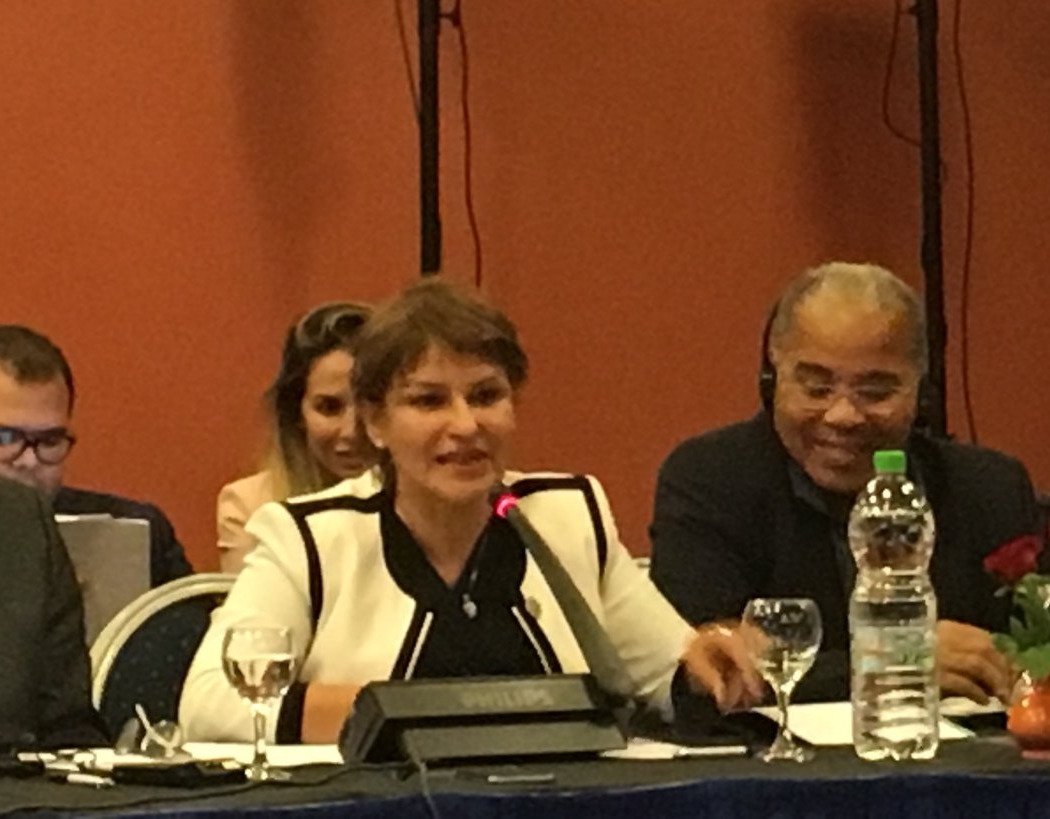[español sigue]
November 3, 2021
Indigenous Peoples’ Caucus Opening Statement for COP26
Glasgow, Scotland - November 3
HIGH LEVEL OPENING
31 October 2021
READ BY: Taily Terena, Terena Indigenous People
Indigenous Peoples are affected first and worst by climate change and colonial climate action, yet we drive critical climate solutions rooted in our relationships with the living world.
In exercising our protection on the frontlines, we face criminalisation, human rights violations, and assassination. And in the COPs, we are excluded from decision making on issues that affect us the most. The COVID-19 pandemic has only exacerbated this injustice.
We call for a rapid reduction in emissions that drives a just transition away from fossil fuels and ensures a 1.5 degree future.
We are deeply concerned by so-called Nature-based Solutions developed without our input and free, prior, and informed consent - undermining our self-determination and secure land tenure.
Our expectations for this COP are that:
Article 6 upholds human rights, and specifically, Indigenous Peoples’ Rights, and leads to real emissions reductions.
Indigenous food sovereignty is centered in all agricultural discussions, and particularly the Koroniva dialogue.
Equitable and long-term climate financing directly to Indigenous Peoples’ Organizations across all seven regions.
A permanent SB agenda item is established on Loss and Damage. Any outcome must safeguard Indigenous Peoples’ Rights and address non-economic losses to our communities.
The draft three-year Work plan of the LCIPP is adopted and implemented, including recommendations of the FWG Report.
The Gender Action Plan is advanced, and upholds land rights, including those of Indigenous women.
Persons with Disability are meaningfully included in UNFCCC processes as a formal constituency.
COP26 and future COPs must ensure the participation of Indigenous Peoples, including those of us with multiple intersections of identity.
Colonialism caused climate change.
Our Rights and Traditional Knowledge are the solution.
Thank you, Chair.
Taily Terena presenting the opening statement of the Indigenous Peoples Caucus at COP26.
Contact: Kera Sherwood-O'Regan
Email: kera@sustainedability.com
Phone: +64 210 410 932
PARA PUBLICACIÓN INMEDIATA
3 de noviembre de 2021
Declaración de apertura del Cónclave de los Pueblos Indígenas para la COP26
Glasgow, Escocia - 3 de noviembre
APERTURA DE ALTO NIVEL
31 de octubre de 2021
LEÍDO POR: Taily Terena, Pueblo Indígena Terena
Los Pueblos Indígenas son los primeros y peores afectados por el cambio climático y la acción climática colonial, sin embargo, impulsamos soluciones climáticas críticas enraizadas en nuestras relaciones con el mundo vivo.
Al ejercer nuestra protección en primera línea, nos enfrentamos a la criminalización, las violaciones de los derechos humanos y el asesinato. Y en las COP, se nos excluye de la toma de decisiones sobre las cuestiones que más nos afectan. La pandemia del COVID-19 no ha hecho más que agravar esta injusticia.
Pedimos una rápida reducción de las emisiones que impulse una transición justa para abandonar los combustibles fósiles y garantice un futuro de 1,5 grados.
Estamos profundamente preocupados por las llamadas soluciones basadas en la naturaleza desarrolladas sin nuestra aportación y consentimiento libre, previo e informado, lo que socava nuestra autodeterminación y la seguridad de la tenencia de la tierra.
Nuestras expectativas para esta COP son que:
El artículo 6 defienda los derechos humanos, y específicamente los derechos de los pueblos indígenas, y conduzca a una reducción real de las emisiones.
La soberanía alimentaria indígena se centre en todas las discusiones agrícolas, y en particular en el diálogo de Koroniva.
Financiación climática equitativa y a largo plazo directamente a las Organizaciones de Pueblos Indígenas en las siete regiones.
Se establece un punto permanente en la agenda del SB sobre Pérdidas y Daños. Cualquier resultado debe salvaguardar los derechos de los pueblos indígenas y abordar las pérdidas no económicas de nuestras comunidades.
Se adopta e implementa el proyecto de plan de trabajo trienal de la LCIPP, incluyendo las recomendaciones del informe del FWG.
El Plan de Acción de Género avanza y defiende los derechos a la tierra, incluidos los de las mujeres indígenas.
Las personas con discapacidad se incluyen de manera significativa en los procesos de la CMNUCC como un grupo formal.
La COP26 y las futuras COP deben garantizar la participación de los Pueblos Indígenas, incluidos los que tenemos múltiples intersecciones de identidad.
El colonialismo causó el cambio climático.
Nuestros derechos y conocimientos tradicionales son la solución.
Gracias, Presidente.
Traducción realizada con la versión gratuita del traductor www.DeepL.com/Translator
Taily Terena presentando la declaración de apertura del Caucus de Pueblos Indígenas en la COP26.
Contacto: Kera Sherwood-O'Regan
Correo electrónico: kera@sustainedability.com
Teléfono: +64 210 410 932










